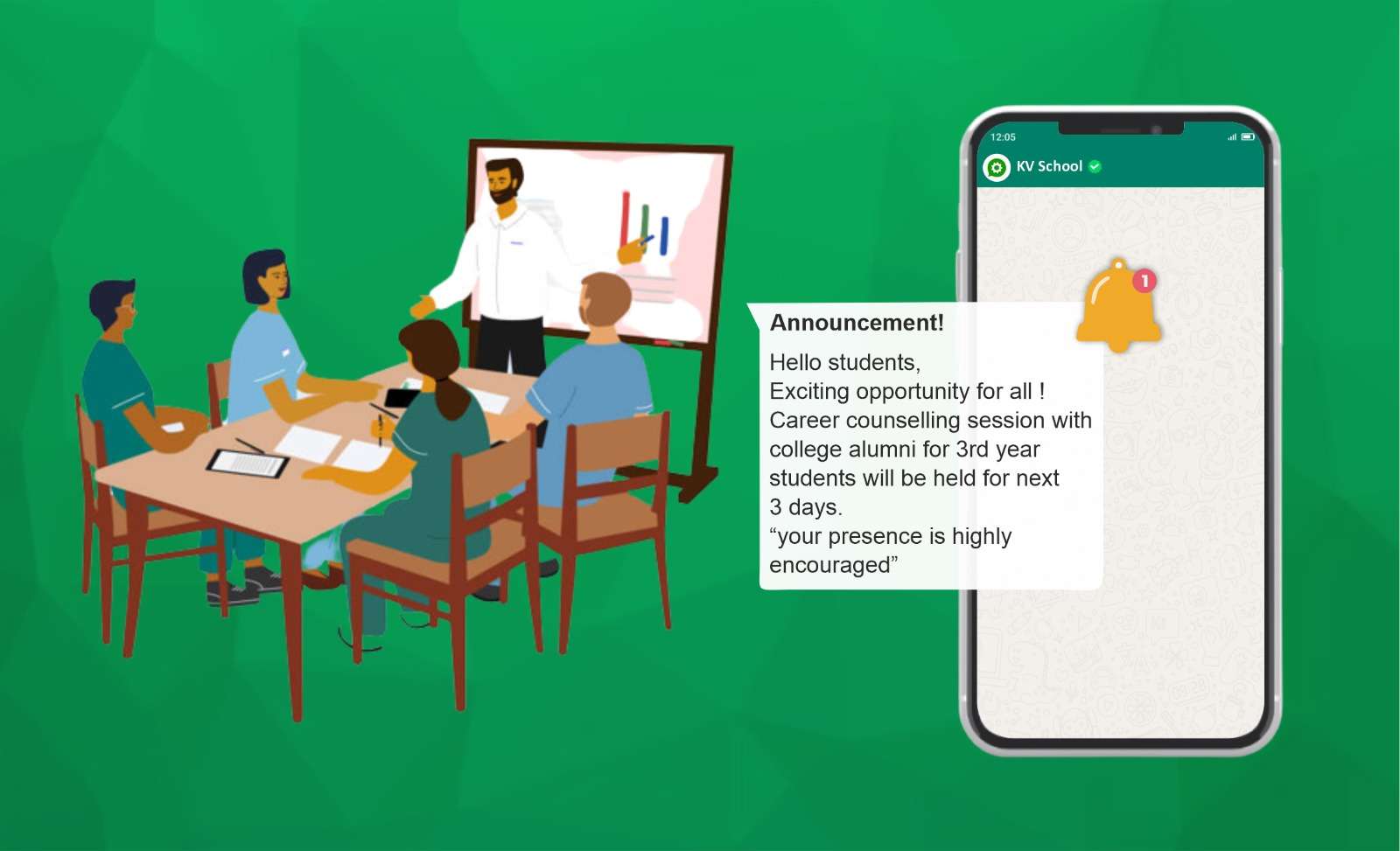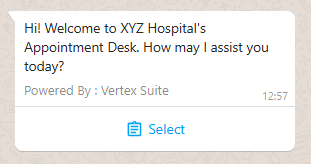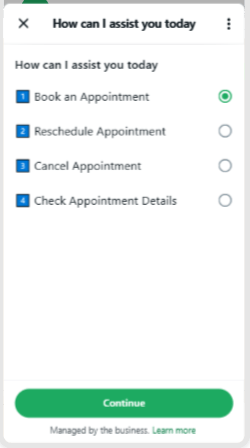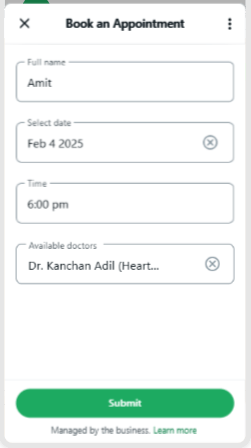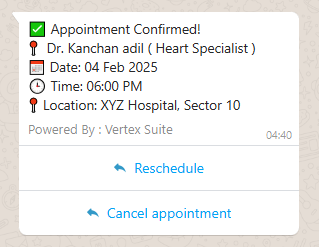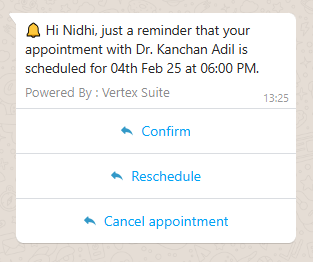In today's fast-paced world, effective communication is at the heart of delivering quality healthcare. Whether it's a private clinic, a large hospital, or a government health organization, clear and timely communication is essential for providing patients with the best possible care. Traditionally, hospitals and clinics have relied on websites and apps for managing appointments, patient records, and general communication. However, these platforms often come with navigation challenges and accessibility issues that can limit their effectiveness.
This is where WhatsApp Business API comes into play, offering an intuitive, user-friendly, and efficient way to streamline communication in the hospital sector. WhatsApp is already a household name globally, making it a trusted platform for millions of users. Through its secure messaging, real-time notifications, and interactive features, WhatsApp Business API is reshaping the way hospitals, clinics, and healthcare providers engage with patients, improve service delivery, and ensure streamlined operations.
In this blog, we’ll explore how WhatsApp Business API is revolutionizing the healthcare sector by enhancing communication, simplifying operations, and creating a more patient-centric approach.
Hospital Communication Challenges
Before diving into how WhatsApp Business API can help, let's look at some of the key communication challenges that hospitals and clinics often face:
1. Too Many Clicks? A Better Solution :
Patients often find it difficult to navigate hospital websites or apps, especially when they need quick access to services like appointment booking, test reports, or doctor consultations.
2. Robotic Replies? Let’s Fix That :
Apps and websites generally provide generic information. They may lack the ability to send personalized updates based on a patient's specific health condition, needs, or preferences.
3. Bridging Gaps in Healthcare Access:
Apps require downloads and installations, which may not be convenient for every patient. Websites might face server downtime issues, slow loading times, or accessibility challenges for people who are not tech-savvy.
4. Language Barriers :
Hospitals often need to cater to a diverse group of patients speaking different languages. Standard apps and websites may not offer adequate language support to ensure all patients fully understand the information provided.
5. Smart Reminders for Better Patient Care:
Hospitals often struggle to ensure that patients are reminded of their upcoming appointments, medication schedules, or follow-ups, leading to missed consultations and treatment gaps.
6. Collect, Analyze & Act on Patient Feedback:
Collecting feedback, conducting surveys, and engaging with patients post-treatment is a critical but often overlooked part of healthcare. Traditional methods may not be efficient enough to capture real-time patient feedback.
How WhatsApp Business API Addresses These Challenges
WhatsApp Business API brings several advantages to the hospital sector, offering a versatile solution that addresses multiple challenges faced by healthcare providers:
1. Easy Booking & Timely Reminders for Patients
One of the most significant advantages of WhatsApp is its simplicity. Unlike apps or websites that require patients to navigate through multiple steps, WhatsApp allows patients to book appointments directly through chat. They can send a simple message like "Book an appointment," and the automated system takes it from there.
Use Case:
- Patients can book appointments with their preferred doctors by simply sending a message on WhatsApp. The system can check availability, confirm the booking, and send automated reminders for upcoming appointments.
- Patients receive reminders a day before their appointment, reducing no-shows and ensuring they don't miss critical consultations.
Example Message:
2. Automated Patient Support and Query Resolution
Hospitals can deploy AI-powered chatbots through WhatsApp to handle common patient queries 24/7. These chatbots can provide information about symptoms, treatment guidelines, medication instructions and much more.
Use Case:
- Patients can ask questions about specific symptoms, and the chatbot can provide initial guidance or direct them to relevant healthcare resources.
- Chatbots can handle inquiries about available doctors, departments, visiting hours, or hospital services.
3. Instant Access to Medical Reports and Documents
Through WhatsApp, hospitals can securely send patient-specific reports, such as lab results, X-ray images, and medical summaries. Patients receive notifications when their documents are ready, and they can access them directly from the chat.
Use Case:
- Patients receive a notification when their lab test results are available and can download the report directly from WhatsApp.
- Medical documents can be securely shared, ensuring privacy and compliance with data protection standards.
4. Real-Time Notifications for Health Campaigns and Events
Hospitals can use WhatsApp to send out announcements and health awareness messages, such as vaccination drives, health check-up camps, and other community health initiatives.
Use Case:
- Inform patients about upcoming health camps, free check-ups, or vaccination schedules in their area.
- Send educational messages about nutrition, preventive measures, and lifestyle changes to manage chronic conditions.
5. End-to-End Encryption for Patient Data Security
WhatsApp Business API ensures secure communication with end-to-end encryption. Hospitals can confidently share sensitive patient information, knowing it is protected against unauthorized access.
Use Case:
- Share confidential patient information, such as test results or appointment details, securely.
- Verify patient identities through OTP-based authentication for accessing sensitive information.
6. Personalized Health Tips and Guidelines
WhatsApp Business API can be used to send tailored health tips, dietary recommendations, and guidelines based on the patient's medical history or ongoing treatment plan.
Use Case:
- Provide post-surgery care tips, dietary guidelines for specific conditions (e.g., diabetes), or reminders for preventive care.
- Send daily or weekly health tips to patients as part of a broader engagement strategy.
7. Break Language Barriers in Healthcare
WhatsApp Business API can be used to send tailored health tips, dietary recommendations, and guidelines based on the patient's medical history or ongoing treatment plan.
Use Case:
- Provide post-surgery care tips, dietary guidelines for specific conditions (e.g., diabetes), or reminders for preventive care.
- Send daily or weekly health tips to patients as part of a broader engagement strategy.
Example Message :
8. Smooth Invoicing & On-Time Payment Alerts
WhatsApp can also handle invoicing, payment reminders, and insurance-related updates, reducing administrative workload and ensuring timely payments.
Use Case:
- Send automated reminders for pending payments, upcoming insurance renewals, or payment confirmations.
- Patients receive digital invoices and can complete payments through integrated payment gateways.
9. Trust & Credibility with Verified Business Profiles
WhatsApp can also handle invoicing, payment reminders and insurance-related updates, reducing administrative workload and ensuring timely payments.
Use Case:
- Send automated reminders for pending payments, upcoming insurance renewals, or payment confirmations.
- Patients receive digital invoices and can complete payments through integrated payment gateways.
10. Efficient Management Through a Centralized Dashboard
WhatsApp Business API offers a centralized dashboard where administrators can monitor communications, manage patient inquiries, and automate messaging. This simplifies operations and provides better visibility into interactions between the hospital and patients.
Use Case:
- Hospital administrators can use the dashboard to schedule messages, monitor response times, and analyze engagement rates.
- Manage health campaigns, appointment bookings, and staff coordination from a single platform.
The Future of Healthcare Communication with WhatsApp Business API
The healthcare industry is constantly evolving, and the way hospitals communicate with patients must adapt accordingly. WhatsApp Business API offers a comprehensive solution that enhances communication, automates routine tasks, and ensures that patients receive timely and personalized care. From appointment booking and health tips to secure sharing of medical documents and real-time notifications, WhatsApp provides hospitals with an efficient way to engage patients, reduce operational costs, and improve service delivery.
For hospitals looking to stay ahead of the curve and offer unparalleled patient care, integrating WhatsApp Business API into their operations is no longer a luxury—it's a necessity.


